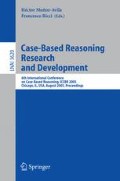Abstract
The situation assessment and similarity components of the interpretive case-based reasoning process are integral for a successful case retrieval. However, for classification problems there are domains where it can be difficult to define sets of relevant features to extract from a problem description. Likewise it is not always obvious which of these features to apply to the similarity assessment process and what, if any, weights they should be given. We suggest learning the concept of similarity by training on a set of past situations. Rather then develop a general function, we store the knowledge gained in individual similarity comparisons as similarity cases. These similarity cases define a similarity space that can be searched to identify how new problem situations can be classified. This paper describes our approach of acquiring similarity cases in the context of a straightforward classification task. A proof of concept system was built that creates similarity cases from a repository of known spam email messages and can use the similarity cases to classify unknown messages as positive or negative examples of spam.
Access this chapter
Tax calculation will be finalised at checkout
Purchases are for personal use only
Preview
Unable to display preview. Download preview PDF.
References
Cunningham, P., Nowlan, N., Delany, S.J., Haar, M.: A case-based approach to spam filtering that can track concept drift. In: Proceedings of ICCBR 2003. Workshop on Long-Lived CBR Systems (2003)
Kolodner, J.: Case-Based Reasoning. Morgan Kaufmann, San Mateo (1993)
Kolodner, J., Simpson, R., Sycra-Cyranski, K.: A process model of case-based reasoning in problem-solving. In: Proceedings of the Ninth International Joint Conference on Artificial Intelligence, IJCAI, Los Angeles, CA (1985)
Koton, P.: Smartplan: A case-based resource allocation and scheduling system. In: Hammond, K. (ed.) Proceedings of the DARPA Case-Based Reasoning Workshop, San Mateo, DARPA, pp. 290–294. Morgan Kaufmann, San Francisco (1989)
Ashley, K.: Modeling legal argument: reasoning with cases and hypotheticals. MIT Press, Cambridge (1990)
Yang, Q., Abi-Zeid, I., Lamontagne, L.: An agent system for intelligent situation assessment. In: Artificial Intelligence: Methodology, Systems, and Applications: 8th International Conference, pp. 466–474. Springer, Heidelberg (1998)
Leake, D.: Constructive similarity assessment: Using stored cases to define new situations. In: Proceedings of the Fourteenth Annual Conference of the Cognitive Science Society, pp. 313–318. Lawrence Erlbaum, Hillsdale (1992)
Rissland, E., Valcarce, E., Ashley, K.: Explaining and arguing with examples. In: Proceedings of the Fourth National Conference on Artificial Intelligence, Austin, TX, pp. 299–294. American Association for Artificial Intelligence (1984)
Branting, K., Porter, B.: Rules and precedents as complementary warrants. In: Proceedings of the Ninth National Conference on Artificial Intelligence, pp. 3–9. AAAI Press, Menlo Park (1991)
Veloso, M.: Planning and Learning by Analogical Reasoning. Springer, Berlin (1994)
Leake, D., Kinley, A., Wilson, D.: Linking adaptation and similarity learning. In: Proceedings of the Eighteenth Annual Conference of the Cognitive Science Society, pp. 591–596. Lawrence Erlbaum, Mahwah (1996)
Smyth, B., Keane, M.: Retrieving adaptable cases: The role of adaptation knowledge in case retrieval. In: Wess, S., Althoff, K., Richter, M. (eds.) Topics in Case-Based Reasoning, pp. 209–220. Springer, Berlin (1994)
Beaver, K.: The Definitive Guide to E-mail Management and Security (2003), http://Realtimepublishers.com
Porter, M.: An algorithm for suffix stripping. Program 14, 130–137 (1980)
Leake, D., Kinley, A., Wilson, D.: Case-based similarity assessment: Estimating adaptability from experience. In: Proceedings of the Fourteenth National Conference on Artificial Intelligence. AAAI Press, Menlo Park (1997)
Aha, D.: Feture weighting for lazy learning algorithms. In: Liu, H., Motoda, H. (eds.) Feature Extraction, Construction adn Selection: A Data Mining Perspective. Kluwer, Norwell (1998)
Cardie, C.: Using decision trees ot improve case-based reasoning. In: Proceeding of the Tenth International Confernece on Machine Learning, pp. 25–32. Morgan Kaufmann, San Francisco (1993)
Kohavi, R., Langley, P., Yun, Y.: The utility of feature weighting in nearest neighbor algorithms. In: Proceedings of the European Conference on Machine Learning (1997)
Aha, D., Wettschereck, D.: Case-based learning: Beyond classification of feature vectors. In: van Someren, M., Widmer, G. (eds.) ECML 1997. LNCS, vol. 1224. Springer, Heidelberg (1997)
Bonzano, A., Cunningham, P., Smyth, B.: Using introspective learning to improve retrieval in cbr: A case study in air traffic control. In: Leake, D.B., Plaza, E. (eds.) ICCBR 1997. LNCS, vol. 1266, pp. 291–302. Springer, Heidelberg (1997)
Cunningham, P., Zenobi, G.: Using diversity in preparing ensembles of classifiers bases on different feature subsets to minimize generalization error. In: Machine Learning: EMCL: 12th European Conference on Machine Learning, pp. 576–587. Springer, Heidelberg (2001)
Androutsopoulos, I., Paliouras, G., Sakkis, V., Spyropoulos, C., Stamatopoulos, P.: Learning to filter spam-email: A compariosn of a naive bayesian and memory-based approach. In: Workshop on Machine Learning and Textual Information Access, 4th European Conference on Principles and Practices of KDD, pp. 160–167 (2000)
Author information
Authors and Affiliations
Editor information
Editors and Affiliations
Rights and permissions
Copyright information
© 2005 Springer-Verlag Berlin Heidelberg
About this paper
Cite this paper
Kinley, A. (2005). Acquiring Similarity Cases for Classification Problems. In: Muñoz-Ávila, H., Ricci, F. (eds) Case-Based Reasoning Research and Development. ICCBR 2005. Lecture Notes in Computer Science(), vol 3620. Springer, Berlin, Heidelberg. https://doi.org/10.1007/11536406_26
Download citation
DOI: https://doi.org/10.1007/11536406_26
Publisher Name: Springer, Berlin, Heidelberg
Print ISBN: 978-3-540-28174-0
Online ISBN: 978-3-540-31855-2
eBook Packages: Computer ScienceComputer Science (R0)

